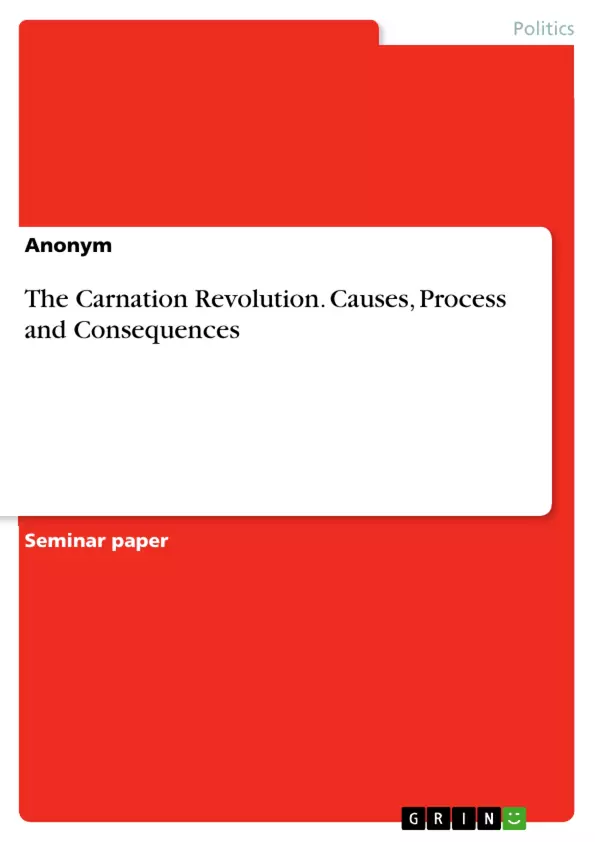Nobody could have thought when on Thursday, April 25, 1974 in Lisbon, shortly after midnight the catholic Rádio Renascença played the song Grandola Vila Morena, it would lead to such consequences. The song was the signal for the young military officers of the Movimento das Forcas Armadas (MFA) to carry out the plans for a coup d’état. Only minor resistance from the security police occurred, so that by late morning the crowds were flooding the streets, cheering the soldiers, and putting carnations in the barrels of the rifles. The coup was efficiently and successfully and still on the same day, the deposed dictator Marcello Caetano surrendered to the new military leaders and already the next day flew into exile. This coup d’état marked the death of the oldest, over 40 years old dictatorship in Europe, lead by António de Oliveira Salazar (Ferreira, 1986).
On the one hand marked April 25 the beginning of transition to democracy in Portugal and later even lead to a consolidated democracy. On the other hand this day marked the beginning of the third wave of democratization. The fall of communist regimes in Eastern Europe, the breakdown of the Latin American authoritarian regimes followed after Portugal brought the ball rolling. And the snowball effect influenced many other authoritarian regimes in the world to democratize as well. States like Spain, Brazil and Hungary were to follow the example of Portugal.
It is the aim of this paper to analyze what the causes were, that lead to the revolution, how the process of the transition occurred and what the consequences of April 25 were.
Inhaltsverzeichnis (Table of Contents)
- Introduction
- The Prehistory of the Carnation Revolution
- Estado Novo and António de Oliveira Salazar
- Economic and social minus development
- The colonial wars
- The summarized causes for the revolution
- The transition to democracy
- The ongoing revolutionary process
- The political development after 1975
- The final consolidation of democracy
- Conclusion
Zielsetzung und Themenschwerpunkte (Objectives and Key Themes)
This paper aims to analyze the causes of the Carnation Revolution, how the process of transition to democracy occurred, and the consequences of the April 25th coup d'état in Portugal. The paper explores the historical context, the political and social factors that led to the revolution, and the subsequent development of democracy in Portugal.
- The legacy of the Estado Novo and its impact on Portuguese society
- The role of the colonial wars in fueling discontent and contributing to the revolution
- The economic and social conditions in Portugal before the revolution
- The transition to democracy and the establishment of a new political system
- The impact of the Carnation Revolution on Portugal and its international standing
Zusammenfassung der Kapitel (Chapter Summaries)
The first chapter introduces the Carnation Revolution, highlighting its significance as a turning point in Portuguese history. The chapter describes the events of April 25th, 1974, and the subsequent overthrow of the Salazar regime.
Chapter two delves into the prehistory of the revolution, examining the political, social, and economic conditions that led to the upheaval. The chapter explores the Estado Novo regime, the colonial wars, and the economic and social challenges faced by Portugal before the revolution.
Chapter three focuses on the transition to democracy in Portugal, outlining the various stages of the process. The chapter explores the ongoing revolutionary process, the political development after 1975, and the final consolidation of democracy.
Schlüsselwörter (Keywords)
The main keywords and focus topics of this work include: Carnation Revolution, Portugal, Estado Novo, António de Oliveira Salazar, colonial wars, democratization, transition to democracy, political change, social change, economic development.
Frequently Asked Questions
What was the Carnation Revolution?
The Carnation Revolution was a military coup on April 25, 1974, in Lisbon that overthrew the authoritarian Estado Novo regime and led to democracy in Portugal.
Why is it called the "Carnation" Revolution?
It is named after the carnations that citizens placed in the muzzles of soldiers' rifles and on their uniforms as a symbol of peace and support for the coup.
What were the main causes of the revolution?
The primary causes included the exhaustion from long-lasting colonial wars, economic underdevelopment, and social discontent under the Salazar dictatorship.
Who was António de Oliveira Salazar?
Salazar was the leader of Portugal's Estado Novo, ruling as a dictator for over 40 years until his successor Marcello Caetano was deposed in 1974.
What was the international significance of April 25th?
It marked the beginning of the "third wave of democratization," influencing the fall of authoritarian regimes in Spain, Latin America, and eventually Eastern Europe.
- Citar trabajo
- Anonym (Autor), 2013, The Carnation Revolution. Causes, Process and Consequences, Múnich, GRIN Verlag, https://www.grin.com/document/301940



